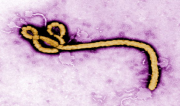CDC's Frieden Calls for More International Support Against Ebola Outbreak
Having seen firsthand the damage done by the Ebola virus outbreak, US Centers for Disease Control and Protection (CDC) Director Tom Frieden, MD, MPH, said that while a lot of work had been put in to help those in need, there was still a lot more work to be done.

Having seen firsthand the damage done by the Ebola virus outbreak, US Centers for Disease Control and Protection (CDC) Director Tom Frieden, MD, MPH, said that while a lot of work had been put in to help those in need, there was still a lot more work to be done.
A press release from the CDC noted that since July more than 500 staff members have assisted in areas like logistics, communication, analytics, and staffing. Of that number nearly 100 have been sent overseas to work in the countries most affected by the Ebola outbreak. Other agencies including the State Department, the Department of Health and Human Services, the US Agency for International Development, and the Department of Defense have also been involved in what has become a globalized effort.
“What I saw was a continuing need to strengthen the health care system by increasing the number of treatment centers, providers, access to supplies; as well as a need to improve clinical management by handwashing, infection control, and other methods,” Frieden noted during a press briefing on the outbreak.
Frieden said one of the most striking images of the trip was going to a newly opened ward designed to treat Ebola patients. There were 35 beds set up to treat patients and within a week he said there were 63 patients receiving treatment at the facility.
“There is a need for data to better trace where Ebola is beginning to spread,” he reported. “And there is a basic need for infrastructure like trucks, jeeps and motorcycles. Perhaps most importantly, there is a need for a functional emergency operations center at either the national or the district levels directing an efficient response.”
Part of the US response to the outbreak has included more than $21 million from the US Agency for International Development (USAID) to buy health equipment, emergency supplies and food as well as to train workers in areas like infection control and case management. The CDC statement noted that last month more than 40 tons of chlorine and 400,000 pairs of medical gloves were delivered to Monrovia on a flight chartered by USAID and UNICEF.
Although there is still a lot of work to be done, Frieden said the efforts so far have proven invaluable.
“I am particularly impressed with the dedication and heroism of the people of West Africa who care for the sick, spread the word about how to prevent Ebola, clean contaminated areas, bury the dead, and welcome survivors back into their homes and communities,” he noted.
During his briefing Frieden said the US is doing a considerable amount to help in the efforts but that it will take more than one country to control the growing crisis. “Stopping this outbreak is more than any one nation can do,” he said at the briefing. The World Health Organization has appealed for close to $490 million in support of the efforts, which Frieden said would go a long way in ending the outbreak.
“I wish every world leader could see what I have seen,” he said. “The sooner the world comes together to help West Africans the safer we all will be.”
The CDC reported that the current outbreak’s total number of cases and deaths has now exceeded the combined total of all other Ebola outbreaks. Without more help Frieden said the numbers will only continue to rise and the damage done to the continent will only get worse.
“The window of opportunity to stop Ebola from spreading widely throughout Africa and becoming a global threat for years to come is closing, but it has not closed yet,” he said. “If the world takes the immediate steps — which are direct requests from the front lines of the outbreak and the Presidents of each country – we can still turn this around.”